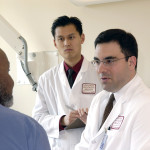April 10th, 2015
Being Taught to Be a Teacher
Guest Blogger
Guest Blogger: Jenna Kay, MD, is a Chief Resident at Emory University Hospital. She will be starting her cardiology fellowship in July, 2015.
How to insert a central line had been drilled into me long before my first attempt, and I was admittedly nervous performing my first procedure as an intern. But, as a senior resident, watching the intern in front of me insert his needle into the patient’s neck was 10 times more anxiety-provoking. I wanted to guide him successfully through the first of many procedures he would need to master, in the same way my senior resident had guided me. I fought a strong temptation to take over entirely. By now, I could do a central line in my sleep. But teach one? I hadn’t given it much thought until that moment.
Medical trainees are provided an extraordinary amount of resources geared toward helping us learn. Beyond experiential learning, we have journals, meetings, webinars, textbooks, virtual interactive cases — just about any imaginable resource for every kind of learner. The opportunities to learn how to teach, however, are a smaller portion of the curriculum and a relatively new area of focus for medical institutions. Before I stood behind my intern that day, I was entirely focused on my own learning. But in that instant, my emphasis shifted: Did I have the necessary skill set to teach? As an aspiring academic clinician, I was hungry for those resources.
In the final month of my intern year, we attended a session with experienced faculty who advised us on effectively leading a team, engaging trainees at different levels, and giving constructive feedback. It all rang true, based on my experience as a learner, but I still felt hesitant to jump in. Teaching seemed to be an immense responsibility that humbled me before I even started.
On my first day as a chief resident, I sat at a pristine desk with a full candy jar and plenty of tissues, but… lead morning report? Me? I was excited by the theoretical possibility of becoming a better teacher but also full of self-doubt and reluctant to ask for help. Did I really want to ask someone to watch me lead a noon conference, or teach aspects of the physical exam that I myself had mastered only incompletely? The answer was no — I did not want to subject myself to scrutiny and judgment in front of an evaluator. But the answer was also an overwhelming yes, because I could see how much potential for growth lay ahead if I could push past my ego.
As part of our faculty development program, I signed up for a teaching mentor. He was full of ideas. We agreed that he would sit in on conference and watch me lead rounds; I made plans to shadow him with his team. I started to recognize and accept other opportunities to teach that I had assumed were only for “real” teachers, and I made a point to ask for feedback, painful as it sometimes was. Hands down, the hardest part was making the decision to ask. Once I took the plunge, I always gained perspective and felt inspired about what to try next.
Now my eyes are wide open, and experience has opened the door to bravery. I’ve been able to take advantage of many teaching opportunities and have started to create a personalized teaching blueprint. When residents come to my office asking for advice on teaching, guiding them is one of the highlights of my job.
Jenna Kay, MD



Any pointers for interns soon-to-be-residents? I feel incompletely prepared to teach an intern, except for the usual 5-point approach, I don’t know if I will be the teacher I wanted my residents to be…
-Get a commitment on the subject
-Probe for supporting evidence
-Teach a general rule
-Reinforce what was done right
-Correct mistakes